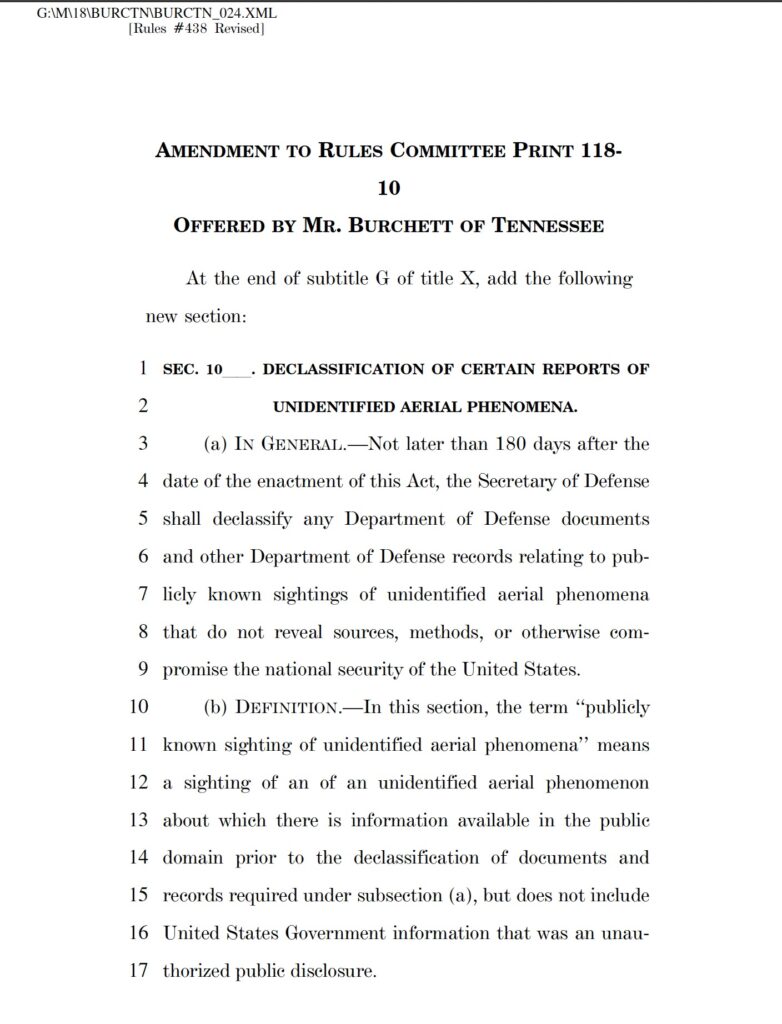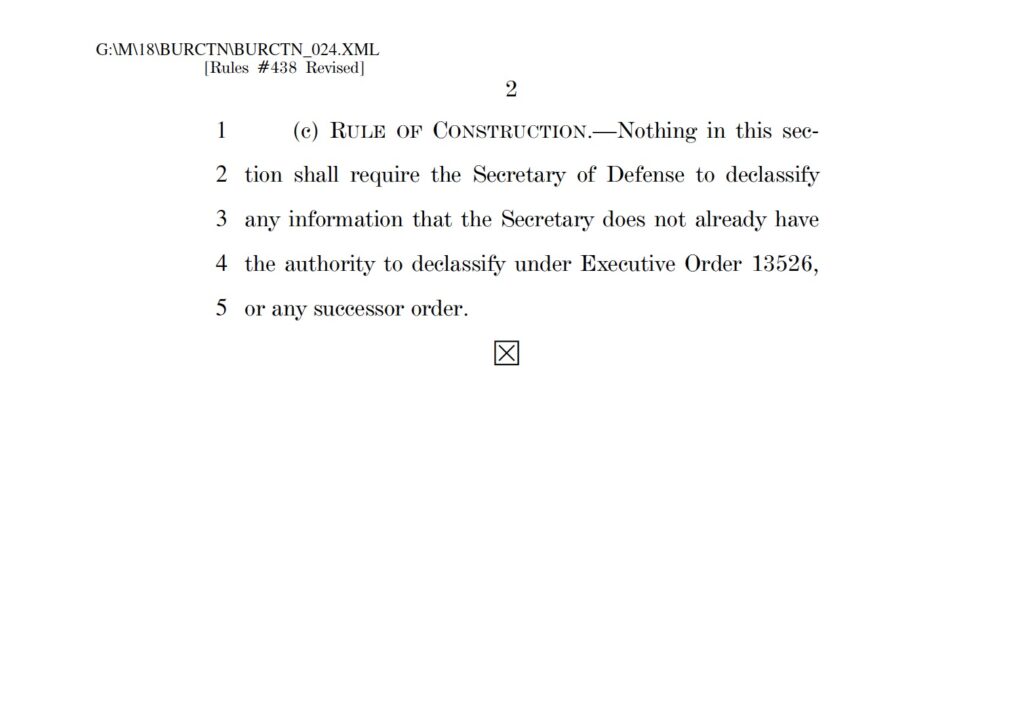Sen. Chuck Schumer’s groundbreaking UAP disclosure amendment is in danger of being killed, the Senator warned on Monday, December 4. Behind the scenes, a battle has been going on to stop disclosure altogether, and also to pit the House’s declassification amendment against the Senate’s. Both amendments were included in separate versions of the National Defense Authorization Act for 2024. Now, while the House and Senate work on approving a bipartisan version of the NDAA, it appears that UFO disclosure may be in danger.
Post Apocalyptic Media has been following both bills since July. Here’s a look at exactly what’s happening.
Learn why a previous presidential administration turned down UFO disclosure in our story here.
Schumer Said the Amendment Would Declassify Many Government UAP Records, But It’s in Danger of Being Killed
On December 4, Sen. Chuck Schumer made a statement warning that the UAP disclosure bill he championed likely won’t pass in its current form.
“Finally, on UAEs, while it’s not related to China, House Republicans are also attempting to kill another common-sense, bipartisan measure passed by the Senate,” Schumer said. “Which I was proud to co-sponsor with Senator Rounds as the lead sponsor, to increase transparency around what the government does and does not know about unidentified aerial phenomenon. Unidentified aerial phenomenon generate intense curiosity for many Americans. And the risk for confusion and misinformation is high if the government isn’t willing to be transparent.”
You can see his full video statement below:
Schumer went on to compare the UAP disclosure bill to the JFK declassification project.
“The measure I championed with Senator Rounds would create a board, just like we did with the JFK assassination records, to work through the declassification of many government records on UAPs,” he said. “This model’s been a terrific success for decades. It should be used again with UAPs, but once again, House Republicans are ready to kill this bipartisan provision.”
You can read Schumer’s bill in full in the embedded window below.
Schumer UAP Bill by Stephanie Dube Dwilson
As Post Apocalyptic Media previously reported, the groundbreaking amendment creates one of the clearest paths for disclosure. But it’s not without its flaws. The idea of creating a declassification path similar to the one for JFK’s assassination raises eyebrows, since to this day, many files that should have been declassified have continually been “reclassified” by sitting Presidents, including both President Joe Biden and former President Donald Trump.
Here’s how it would work:
- Biden would appoint nine people to a declassification review board, approved by the Senate.
- The National Archives and Records Administration would create a collection of UAP and UFO records, The Hill reported.
- After that collection is created, a UAP Records Review Board (an independent agency) would consider if any particular record should have its disclosure delayed, a press statement about the bill noted.
- Next, Biden could choose to overturn or concur with the Review Board’s recommendations, the press statement reported.
- Each record must be fully disclosed no later than “25 years” after the law is enacted, unless the President seeks continued postponement, according to the press statement.
The amendment also notes that the U.S. government would get “eminent domain over any and all recovered technologies of unknown origin (TUO) and biological evidence of non-human intelligence (NHI) that may be controlled by private persons or entities in the interests of the public good.”
The opening section of the amendment, interestingly, states: “All Federal government records concerning unidentified anomalous phenomena should carry a presumption of immediate disclosure…”
Some House Republicans Have Expressed Concerns About Schumer’s Amendment
Tim Burchett, a House Republican who advocates for UAP disclosure, said in a News Nation interview on November 30 that while he doesn’t care who gets credit for disclosure, there are some elements of Schumer’s amendment that concern him.
“There’s a Schumer amendment, there’s my amendment… I don’t care who gets credit for it… I just feel like, we gotta have transparency…” Burchett began by saying. “Sen. Schumer’s amendment…is a bunch of pages. Mine is a page and a half. You know me, I’m pretty plain-spoken. I’m not knocking Schumer. I’m honored that he would get involved in this thing…. Senator Schumer’s amendment has a board of like 10 people; they get to review something. Here’s me thinking…We’ve got 10 people that have security clearances that are not elected, not Congress people. Where are they from? They’re from the freakin’ defense industry. They’re the only people who would have those security clearances. And they’re gonna be deciding. They’re the ones who we think have all this information… They’re gonna be the ones deciding if we get to see it or not. So to me brother, that creates a whole new problem.”
You can watch the interview below.
Rep. Tim Burchett talks with Chris Cuomo about UAP legislation.#ufox #ufotwitter #ufo #uap pic.twitter.com/6WVIeJxhAB
— UAP James (@UAPJames) December 1, 2023
According to the amendment, there would be nine people on the review board, which is intended to be an independent agency. They would need a reason to keep documents classified since the amendment carries a presumption of immediate disclosure, Democrats shared in a press release about the amendment. The amendment also calls for each UAP record to be publicly disclosed “no later than 25 years after the law is enacted, unless the President certifies that continued postponement is necessary because of a direct harm to national security.”
It’s this last stipulation that particularly concerns people, since the same loophole is being used to keep some JFK records classified to this day.
Some House Republicans Are Advocating for Burchett’s Amendment Over Schumer’s, But It Contains the Same Loopholes
Rep. Matt Gaetz, who has also spoken in favor of UAP disclosure, said on November 29 that he prefers Burchett’s UAP NDAA Amendment.
Gaeta said Burchett’s version “mandates the Department of Defense (DoD) to declassify the military’s knowledge on UAPs within 180 days of the NDAA’s enactment.”
He added, “Instead, @SenSchumer is trying to jam his amendment through the NDAA conference that would establish a commission akin to the decades-long JFK investigation. Under the commission, it could take up to 25 years to declassify documents and records related to UAPs. This is unacceptable.”
But Burchett’s amendment also has its flaws, as we previously reported. The original version that Burchett proposed was farther reaching than the one that ended up in the House’s version of the NDAA. We compared both versions here. The approved version added a loophole similar to the one in Schumer’s, which notes that declassification would only apply to documents “that do not reveal sources, methods, or otherwise compromise the national security of the United States.”
The amendment also only applies to “publicly known sightings of unidentified aerial phenomenon” that involve Department of Defense documents and records. It defines relevant sightings as “a sighting of an of an unidentified aerial phenomenon about which there is information available in the public domain prior to the declassification of documents and records required under subsection (a), but does not include United States Government information that was an unauthorized public disclosure.”
Burchett’s amendment also has a rule of construction that does not give the Secretary of Defense authority over anything that didn’t already fall under their purview.
It notes: “RULE OF CONSTRUCTION.—Nothing in this section shall require the Secretary of Defense to declassify any information that the Secretary does not already have the authority to declassify under Executive Order 13526, or any successor order.”
You can read the amendment that’s in the NDAA below.


So in many ways, Burchett’s amendment is narrower than Schumer’s, and still has the same national security loophole. However, it does push for faster declassification than Schumer’s amendment.
It would be nice if the final NDAA could ultimately include both Schumer’s and Burchett’s amendments (even though the national security loophole would still exist for both), without further watering either one down.
But at this point, UFO disclosure seems to be in danger from political infighting, among other issues. We’ll keep a close eye on what happens next.
Want to chat about UFOs? Join our Discord UFO channel here. You can also follow us by email here, on Facebook, or Twitter.

